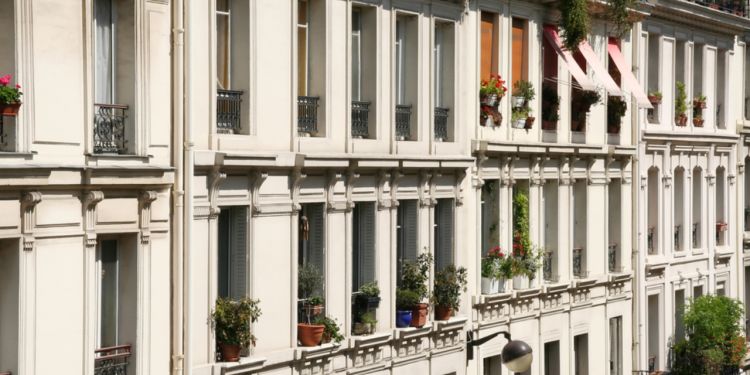
Have you decided to move to Paris? Congrats! The City of Lights is going to win you over with its culture, food, and beauty, both day and night. One of the most important parts of your move will be figuring out where to live. Finding a place to call home is key if you want to fully enjoy your new life there. Here are some essential tips to help you find the perfect apartment in Paris!
The rental market and rental prices in Paris
Renting in Paris is expensive, and it's a big worry for a lot of people who live there or are planning to move there. The French Capital is famous for sky-high rents since there's always a ton of demand but not enough affordable places to live. The Paris real estate market is rather complex – apartments get snatched up super fast, so you have to act quickly, or you might miss out. However, don't stress too much; it doesn't mean you'll end up homeless. If you stay positive and are willing to be a bit flexible, you can probably find a decent place sooner than you'd expect.
The average rent in Paris is around 30 to 40 euros per square meter a month, but it depends. Smaller places like studios usually cost more per square meter than bigger apartments. Rent is highest in the central parts of Paris, like the 1st, 4th, and 6th arrondissements, since those areas are super desirable and in high demand.
On the other hand, outlying districts, such as the 19th, 20th, and surrounding suburbs, generally offer lower rents. Areas farther from downtown are more affordable but may require longer commute times to access downtown amenities.
It's also important to note that the rental market in Paris is very dynamic, with apartments that rent quickly. Tenants often need to react quickly to new adverts and be prepared to provide a full dossier to increase their chances of securing accommodation.
Which arrondissement in Paris to live in?
Any expat will want to live in an area where they feel comfortable and have everything they need nearby. Students will want to be close to their university, families will look for good schools and kids' activities in the area, and professionals will ideally live near their workplace or at least well connected with public transport. The good news is that no matter which neighborhood you choose, Paris has such a diverse range of options that you're guaranteed to find the perfect spot. Here are some of the most popular Parisian neighborhoods among expats, with both furnished and unfurnished apartments available.
The 5th arrondissement
The 5th arrondissement is the famous Latin Quarter, known for its narrow streets, renowned universities, beautiful gardens, and impressive monuments. It's bordered by the Jardin des Plantes, the Pantheon, and the Grand Mosque of Paris. The boulevard Saint-Michel, between the 6th and 5th, is a hotspot for artists and book lovers, with iconic bookstores and art-house films in small cinemas. A walk along the Seine near the riverbanks is a must. Students flock to the Faculté d'Archéologie, the Faculté de pharmacie, the Faculté de médecine, as well as the École parisienne des Langues. Prestigious lycées like Montaigne and the Collège de France attract families. The 5th has a perfect mix of culture, academics, and Parisian charm, but keep in mind rents can be steep since it's so popular.
The 7th arrondissement
Who doesn't dream of moving to Paris and living near the Eiffel Tower? If you live in the 7th arrondissement, that dream can be a reality! It's the perfect neighborhood for experiencing the Parisian lifestyle. It's also known for being quiet, as long as you don't live right next to the famous tower built for the 1889 World's Fair. You'll find apartments in classic Parisian buildings, but rents are on the high side. The neighborhood has great places to walk, like the Esplanade des Invalides and the banks of the Seine River, with plenty of bars to stop for a drink. Many prestigious schools are located here, too, including the Lennen Bilingual School and École Montessori Bilingue de Paris. Living in the 7th arrondissement means waking up to stunning views of the Eiffel Tower while also being close to some of the best educational institutions in the city.
The 11th arrondissement
Sitting between the well-known Bastille, République, and Nation squares, this district is a favorite of students and night owls, with streets packed with all kinds of bars and restaurants. The popular, trendy soul of this historic arrondissement makes it an interesting place to visit if you're looking for authenticity and liveliness. You'll also find lots of universities, schools, and apartments here, some at great prices for students. The 11th arrondissement is a lively, dynamic area that's perfect for young people looking for exciting nightlife and affordable places to live.
The 15th arrondissement
The 15th arrondissement is perfect if you want a lively vibe and good medical facilities nearby. It's the most populated area on the west side of Paris. The most well-known neighborhoods are Vaugirard, Necker, and Montparnasse, where you'll find the iconic Montparnasse Tower and lots of Breton creperies and shops. There are also many medical centers, including the famous Necker Hospital. And if you're into culture, the 15th has you covered, with several theaters and museums like Théâtre La Croisée des Chemins, the Montfort theater, and the Bourdelle, Postal and Étincelles museums at the Discovery Palace.
The 16th arrondissement
The 16th is the biggest and greenest neighborhood in Paris. It's super popular with expats because of its upscale vibe and is considered the most posh part of the city. Nature lovers will enjoy being close to the famous Bois de Boulogne Park, especially families with kids who can take them there to run around and play. Runners will love it, too. Plus, if you want a view of the Eiffel Tower, the 16th is one of the best places to look for an apartment! All in all, it offers a quiet, relaxed setting with nature nearby, but is still close to Paris' most iconic sights.
The 17th arrondissement
If you're moving to Paris with your family, the 17th arrondissement in the northwest is a great choice. Located in the north-west of Paris, you'll find numerous markets and local shops where you can do your weekly shopping. You'll find quality produce, often local. Plus, the area has plenty of parks and green spaces to take the kids and get them excited about nature. You can also check out famous landmarks like the Hôtel Gaillard and contemporary museums like ART42, a street art museum inside a computer school.
The Hauts-de-Seine
Although the Hauts-de-Seine is not part of the Paris metropolitan area, its proximity to the La Défense business district makes it a great place to live. Don't hesitate to look in the towns of Neuilly-sur-Seine, Boulogne-Billancourt, and Levallois-Perret, where you'll be sure to find some interesting housing offers.
Cities in the eastern and southern suburbs of Paris can also offer attractive housing options, especially if you're looking for a more peaceful setting.
Sharing a flat in Paris
If you're on a budget, sharing an apartment with roommates is a great way to save money while improving your language skills and meeting new people. To get started, check out roommate finder sites like Appartager or La Carte des Colocs.
What to expect when looking for accommodation in Paris
Paris is known for its beautiful, high-end apartments, but those are pretty pricey. Most people live in much simpler accommodation. A lot of students and young professionals in Paris rent small studio apartments. Studios are usually up on the top floor of buildings there. The buildings often have bigger apartments on the lower floors with elevators, and then the studios are on the upper level without elevator access.
Looking for accommodation
When you're looking to rent, make sure to network and reach out to as many people as you can. Many rentals and sublets happen through people you know — someone looking for a renter or someone else looking for a place. Use social media, too: join local housing groups on Facebook or post about what kind of place you're trying to find.
The budget
Don't count on negotiating the rent since apartments are in really high demand, and there's usually a long line of people happy to pay the listed price. Be realistic about what you can afford, and remember to factor in extra costs like the annual housing tax (which depends on the apartment size and location), utilities, and the Internet.
Rents in Paris vary considerably according to apartment size and location. Here are some estimates:
Firstly, studios, which are apartments of around 20 to 30 m². In the central arrondissements of Paris, such as the 1st to 4th arrondissements, rents for these studios generally range from €900 to €1,500 per month. However, in more peripheral but still popular districts such as the 10th, 11th, and 18th arrondissements, rents can be slightly lower, ranging from €700 to €1,200 per month.
If you're looking for a two-room apartment, around 30 to 50 m², prices rise accordingly. In central Paris, expect to pay between €1,500 and €2,500 per month. In working-class neighborhoods, these apartments can cost from €1,200 to €2,000 per month.
Three-room apartments, from 50 to 80 m², are generally more expensive. In central Paris, rents range from €2,500 to €4,000 per month, while in working-class neighborhoods, you can expect to pay between €2,000 and €3,500 per month.
Finally, prices are even higher for apartments of four rooms or more, i.e., 80 m² or more, in central Paris, often exceeding €4,000 per month.
Keep in mind these are just ballpark figures that can change based on things like the property's quality, exact location, building condition, and the housing market. Plus, high demand for housing in Paris can drive up prices. To get the most accurate and current rental info, your best bet is to check out real estate websites or reach out to local real estate agencies.
How do I find a home in Paris?
In Paris, some agencies manage both property rentals and sales. Once you've chosen your preferred neighborhood, visit a local real estate agency there to submit a rental application, or contact the agents directly if possible. Note that this process usually involves fees, but it can be highly beneficial, especially for expatriates. Many agents in Paris speak multiple languages and are experienced in assisting foreigners. Be upfront about your preferences and budget so they can identify suitable options for you.
You can also browse websites like Se Loger, Paru Vendu, and Le Bon Coin to find apartment listings in Paris. Set up alerts on these platforms to receive immediate notifications when properties matching your criteria are listed. This way, you won't miss out on any good options and can contact the owner as soon as the listing becomes available.
Move fast and set up visits, but don't waste time. And if you're not in Paris, see if a virtual visit works. You can also find apartments on some less official sites, but watch out – there are a bunch of scams on those, so be super careful. Of course, there are real listings, too, so if you're cautious, you might find a place to rent directly and avoid paying extra agency fees.
What about the security deposit or guarantor in Paris?
When you rent a place, you'll usually have to pay a security deposit equal to one month's rent, plus the first full month of rent, before moving in. If you're self-employed and don't make at least three times the monthly rent, the landlord might ask you to get a guarantor. This is an official agreement stating that this person (i.e., the guarantor) is willing to pay your rent if you fail to make the payment. Just keep in mind that your guarantor has to live and work in France, so it can't be a relative back home.
The Visale guarantee, which stands for "Visa pour le Logement et l'Emploi" ("Visa for Housing and Employment"), is a French rental guarantee scheme designed to facilitate access to housing for certain categories of tenants. It's mostly for young people under 30 who are job hunting or don't have stable jobs. But now Visale has expanded, so private sector workers over 30 can use it too if they meet some requirements.
The best thing about Visale is that it's a free rental guarantee for tenants. It covers unpaid rent and utilities for up to 3 years and sometimes even longer. It can also cover any damage done to the rental property.
Foreigners living legally in France may be able to benefit from Visale, but it depends on their residency status. If you're a foreigner interested in Visale, you should check with the organization to see if you're eligible.
Putting together an application to rent a property in Paris
If you're looking for an apartment to rent in Paris, you'll be familiar with the term dossier – a folder of key documents to show you're a reliable renter. This dossier can be crucial to your success as a potential tenant, so make sure you have all your documents in order. As a general rule, you'll need a copy of your passport, your employment contract, your most recent pay slips, and a French bank account statement. Make sure you have your papers to hand so you can act quickly if you find the apartment of your dreams! Many people go to viewings with their files already prepared!
Short-stay accommodation in Paris
If you're visiting Paris for less than 3 months, whether for a short stay or just a quick sightseeing trip, you'll need a place to stay. But no worries – Paris is a major tourist destination with tons of options. You can find everything from basic to high-end hotels, Airbnbs (although the city has cracked down on them recently), houseboats, hostels, and short-term apartment rentals. There's something for every budget and taste.
The cost of temporary accommodation in Paris depends on several factors, including the length of the rental, the type of accommodation, and the location.
Hotels in Paris can be expensive, especially in central districts such as the Marais or the Champs-Élysées. On average, a night in a three-star hotel costs between €100 and €250, while luxury hotels can exceed €400 per night. A rented studio apartment can cost between €80 and €200 per night, while a two-room apartment can cost from €150 to €350 per night.
Youth hostels are an affordable option for travelers on a budget. A night in a shared dormitory can cost between €20 and €50, depending on the season and location. Renting a room from a private home can also be an economical option. Rates vary, but on average, rooms range from €30 to €80 per night.
For longer stays, hotel residences often offer weekly or monthly rates. You can expect to pay between €1,000 and €3,000 per month, depending on apartment size and location.
We do our best to provide accurate and up to date information. However, if you have noticed any inaccuracies in this article, please let us know in the comments section below.











